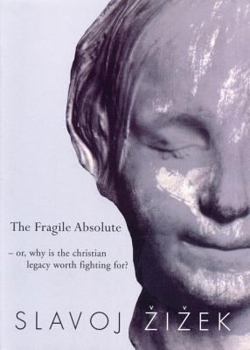The Fragile Absolute: Or, Why Is the Christian Legacy Worth Fighting For?
Select Format
Select Condition 
Book Overview
From now on, even though we once knew Christ from a human point of view, we know him no longer in that way; everything old has passed away, see, everything has become new This description may be from another edition of this product.
Format:Paperback
Language:English
ISBN:1859843263
ISBN13:9781859843260
Release Date:October 2001
Publisher:Verso
Length:182 Pages
Weight:0.52 lbs.
Dimensions:0.6" x 7.6" x 6.2"
Customer Reviews
3 ratings
Cristianismo-Leninismo
Published by Thriftbooks.com User , 18 years ago
En 1940, Walter Benjamin ilustraba la historia como una partida de ajedrez entre las fuerzas dominantes y un títere llamado "Materialismo Histórico" que era manejado por "Teología": una enana que se escondía por ser tan fea. Ahora es lo contrario: el "giro teológico" posmoderno es enseñar a la teología y esconder el materialismo histórico por asqueroso e intocable. Restos de un pasado paria. Si Marx aparece en Newsweek es por su crítica sofisticada del fetichismo. Lenin, en cambio, es impresentable: un fanático oriental, como Mao. Esta es la tesis de Slavoj Zizek quien retoma el cristianismo paulino como una versión pre-leninista de la revolución. Zizek arguye por una ética incondicional, consciente hasta las últimas, como en San Pablo y Lenin. El compromiso "revolucionario" no es solamente con el Nuevo Comienzo sino con el Terror que trae: la tarea de Lo Peor con sus mártires y purgas. Cuando vemos que todos los pueblos atrasados "aspiran" a la democracia, olvidamos que ésta sueña perversamente con paredones. El terrorismo fue lo mejor que pudo pasarle a la democracia: no la puso sobreaviso sino que le regaló más control migratorio, menos derechos civiles y más racismo. Pero la anestesia de la filosofía democrática prolifera con éticas y políticas cursis que ni se diferencian de un catálogo de perfumes. Espejos de un aristotelismo siempre mediocre: de liberales a socialistas. Por dichas taras, segun Zizek, cualquier autenticidad o radicalismo es fundamentalista y ortodoxa. La falta de pasión se complementa con la guerra global. El acto de guerra del 11-S todavía se considera impensable y la ausencia bélica se compensa con el más grande gasto militar de la historia. El consenso (u oportunismo trascendental) se ayuda con éticas "profesionales" e ideologías dormilonas: acción comunicativa, indecibilidad, autorrealización personal, los hombres son de Marte, las mujeres de Venus, etc. Es la evidencia borrega de la falta pública de evidencia. Por eso, para Zizek, la huida contemporánea a la "teología" es lo propio de las tendencias privatizantes en la sociedad cosmopolita. En la "hospitalidad" cosmopolita, la empatía se combina con la náusea. Se desinfectan las otras culturas de sus excrementos como se fumigan las religiones de su fe. Sus tradiciones son de un paraíso perdido y al mismo tiempo, estúpidas y sexistas. Como en el desapego budista, el otro encanta y al mismo tiempo apesta. Las "minorías" sexuales demandan derechos del Estado y al mismo tiempo quieren ser "contraculturales". En las Universidades occidentales, está bien ser anarquista pero con un puesto en propiedad. Para Zizek, en la sexualidad actual, donde lo normal es ser sadomasoquista; el Capital nos demanda perversiones sin subversiones. La Ley no sería la Represión, sino el imperativo del Goce, por lo que nos sumimos en una pulsión indiferente. El núcleo "perverso" del cristianismo, en Zizek, está en la muerte de Cristo como evento que encuentra su fidelidad posterior en el goce
Theology for Marxists, Atheists and Agnostics
Published by Thriftbooks.com User , 21 years ago
A self-described "fighting atheist," though not a very conventional one, and an avowed Marxist, though not a very typical or orthodox one, Žižek writes rooted deeply within Lacanian psychoanalysis in order to produce some of the most intriguing, bewildering, and relevant philosophy concerned with post-modern conundrums such as relativism, agency, and subjecthood. Žižek in this work embraces the shared Marxist and Christian messianic visions of history as an alternative to both the post-modern, New Age-Gnostic moral sludge dominating PC culture and the excesses of capital. The true heart of the work-and its most convincing parts as well-occur mid-way through in Žižek `s treatment of Pauline agape vs. the Law/Sin dialectic as it relates to modern human rights. More or less, this is a desperate attempt to revive Marxism as an alternative to Liberalism. Good Luck.Žižek writes in a frenetic, gregarious style that is endearing but not necessarily rigorous. His penchant for citing movies, novels and popular culture besides the likes of Schelling, Lacan, Hegel and Heidegger lightens the atmosphere, but the problem is that many things that he says, many conclusions he arrives at from overly generalized instances of cultural practice are just blatantly false. Also, it can be annoying when he rambles on for five pages about a movie you've never seen, thus, making any attempt to understand his point tedious. [Recommendation: definitely make sure you've watched Hitchcock's VERTIGO before reading this book].For me, Žižek is one of the authors with whom I part ways with on the big questions but with whom I often side with on the smaller questions. His acuity in the realm of cultural interpretation and his applications of Lacanian psychoanalysis to politics are both haunting and memorable long after you've finished the books. Re-reading this book, I came across this passage in footnote #12 that sent shivers down my spine with it's accuracy.
Zizek again!
Published by Thriftbooks.com User , 22 years ago
Zizek at his all time high (takes Lacan with him)!






